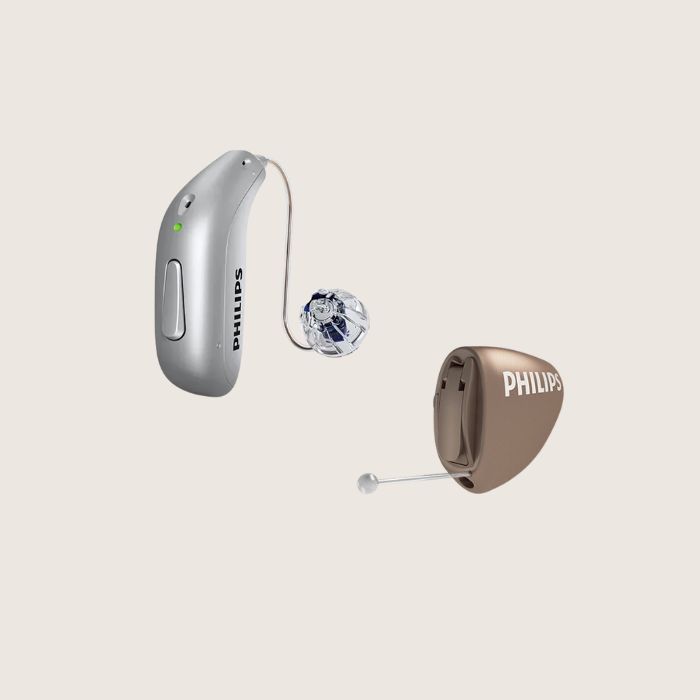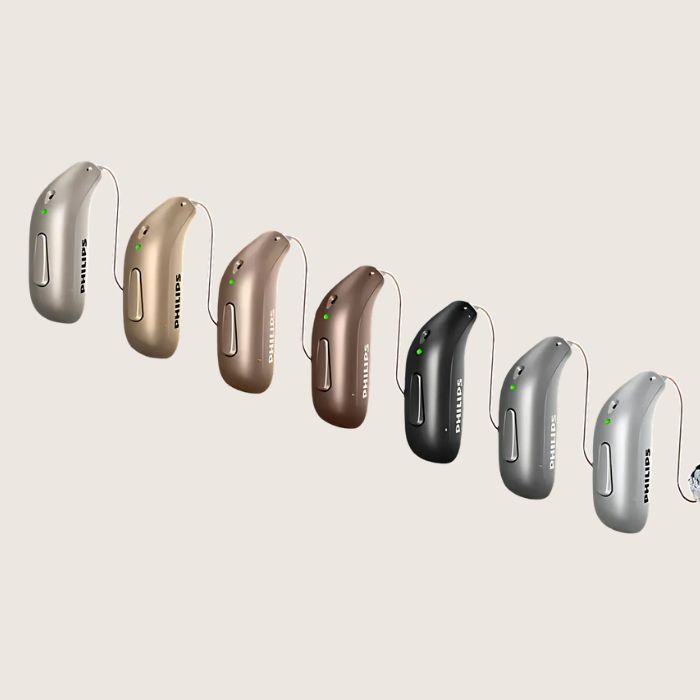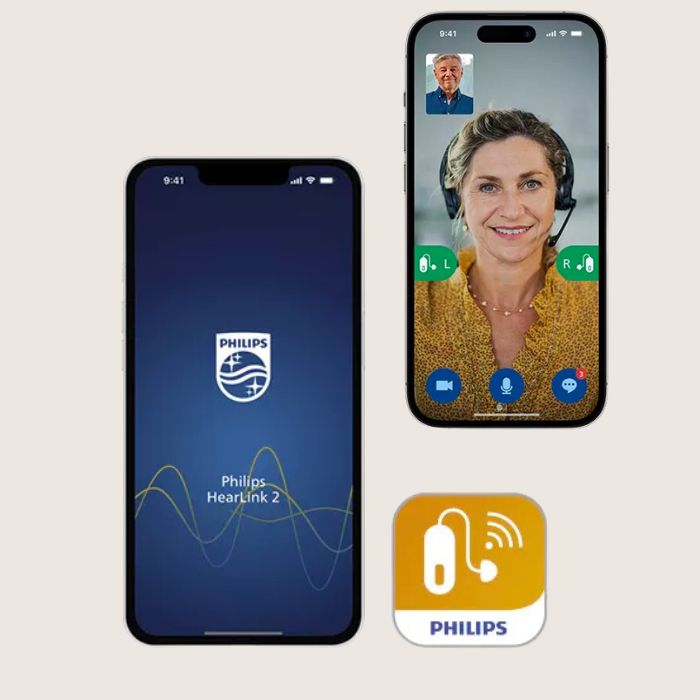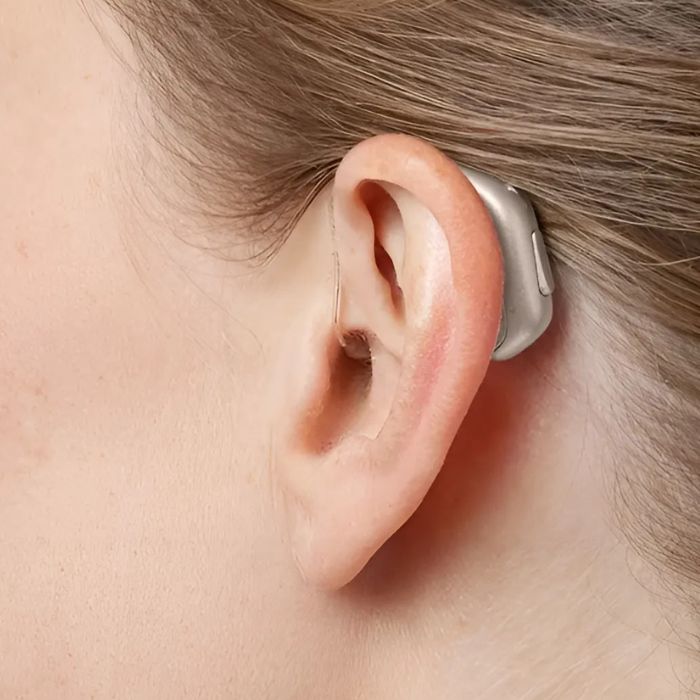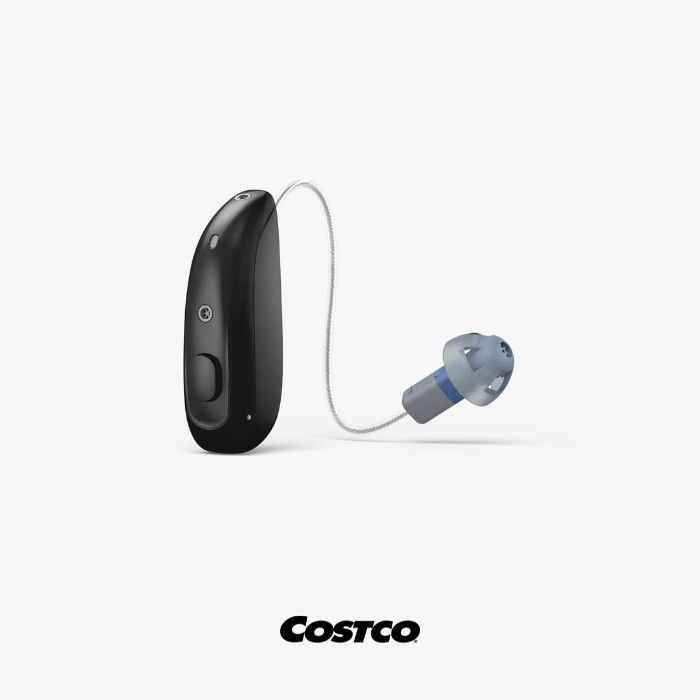Philips 9050 (Costco)
Philips HearLink 9050 at Costco
Costco currently offers three main hearing aid brands through its in-store clinics: Philips, Jabra, and Rexton. The Philips line comes from Demant Group, the same company behind the highly respected Oticon brand, often found in audiology clinics.
That connection is especially relevant with the Philips HearLink 9050, released in mid-2024, which shares much of its underlying technology and design philosophy with Oticon’s flagship, Oticon Intent.
The HearLink 9050 represents a meaningful upgrade from previous Philips models, most notably in its new exterior design, sound processing features and Bluetooth connection style. The devices are shorter and slightly wider than the outgoing HearLink 9040 and bear a strong resemblance to Oticon’s latest designs—more refined and modern in look and feel.
Major technology improvements:
- ✅ SoundMap 3: An upgraded sound processing algorithm designed to enhance speech clarity, especially in noisy environments.
- ✅ SoundProtect: A feature that better manages disruptive noises like wind, hand contact, or sudden clatter—making everyday sounds more comfortable.
- ✅ SoundGuide with accelerometer sensors: This new sensor tracks your head and body movements to better determine your listening intent, improving how sound is processed based on where you're looking or moving.
Bluetooth Upgrade:
The 9050 series also includes Bluetooth LE Audio, the latest connectivity standard that sets the foundation for future compatibility with Auracast—a technology that will eventually allow hearing aids to tap into shared audio streams in public places like airports, stadiums, and lecture halls.
Battery Life:
When it comes to battery life, the HearLink 9050 offers up to 20 hours on a full charge, which is slightly less than some other options at Costco. However, it comes with a supercharge feature—providing up to 8 hours of use from just 30 minutes on the charger. As of now, the 9050 is available only in a rechargeable model; there’s no disposable battery option or alternate styles.
All in all, the Philips HearLink 9050 brings premium clinic-level technology to Costco’s shelves—at a lower price then you might pay elsewhere.
How Philips Compares to Other Costco Options
If you’re comparing Philips to Jabra and Rexton hearing aids at Costco, it’s helpful to know that all three brands are backed by leading global manufacturers. In our reviews, Rexton tends to stand out for its longer battery life (37+ hours per charge), modern travel charger, and a sound quality that feels smooth and relaxed—great for extended listening comfort. Jabra, on the other hand, offers a smaller form factor, longer battery life, and a sound profile that’s a bit more assertive and bright.
Philips HearLink 9050 lands somewhere in the middle: while its battery life is slightly shorter, it makes up for it with cutting-edge sound processing, motion sensors, and next-gen connectivity features like LE Audio. If you're drawn to the idea of Oticon-level tech at a more accessible price, Philips is a strong contender worth considering.
Each brand has its strengths—your best fit will depend on your preferences around design, sound quality, and lifestyle features.
- Free hearing test for members.
- Lower prices compared to similar products in clinic.
- One loss or damage replacement for free (valid for two years).
- Clean your hearing aids any time at Costco for free while you shop.
- Membership required.
- Costco relies mainly on hearing aid dispensers rather than audiologists.
- Requires regular in-person visits (not possible for some).
- Phonak, Starkey, and Widex are not available at Costco.
- Philips offers a family of fully customizable, prescription hearing aid appropriate for mild-severe hearing loss
- If you have severe hearing loss, your care provider may fit you with a custom earmold to reduce feedback
- Philips hearing aids are fit and programmed by a professional at Costco
- Most wearers select a behind-the-ear hearing aid but Philips is also offered in custom-molded styles
- To create your custom hearing aids, you Costco professional will take earmold impressions. They will then send those impressions to the Demant manufacturing facility where a one-of-one replica will be created for your hearing aids
- After an initial fitting process, you can connect with your care provider remotely through the Philips app
- Philips behind-the-ear hearing aids come with a new operating system (released in 2025). Philips uses a deep neural network to sort background noise from speech. Many users describe Philips's sound quality as "relaxed," "natural," and "comfortable."
- Philips in-the-ear hearing aids use slightly older underly technology but still do a great job managing background noise.
- Philips behind-the-ear devices are very comfortable product with a wide-variety of possible earmolds, domes and fits.
- Philips in-the-ear options sit comfortably in the ear. Some users with better hearing in lower frequencies prefer an open-fit behind-the-ear style hearing aid that allows more natural sound to pass into the ear canal.
- Most wearers choose Philips hearing aids that sit behind the ear
- Philips can be purchased in 5 sizes from invisible to half-shell
- Behind-the-ear Philips hearing aids come in several colors including beige, black, brown, dark gray, gray, and taupe
- Philips Hearlink 9050 hearing aids come only with rechargeable batteries (no disposable option)
- The rechargeable, behind-the-ear version of Philips hearing aids gets 20 hours of power on a single charge
- The Philips HearLink 9050 allows Bluetooth streaming, music listening, and phone calls across all models. iPhone users can take calls hands-free, while Android users typically need to keep their phone nearby to transmit their voice during calls.
- The devices support Apple’s MFi and Android’s ASHA protocols and include Bluetooth 5.3, making them Auracast-ready once that technology becomes available through a future firmware update.
- Philips behind-the-ear options are reasonably easy to handle but does require the wearer to place the hearing aid behind their ear and insert the receiver into the ear (consistent across all behind-the-ear styles)
- All sizes and styles within the Philips in-the-ear family require regular disposable battery changes and good dexterity. The smallest two sizes (CIC and IIC) are especially difficult to manage due to their smaller size 10 battery
- Philips hearing aids across styles are water resistant with an IP rating of 68
- These hearing aids can withstand dust and water submersion in one meter of water for up to 30 minutes
- Remote care: included in the new Philips app
- Customization: volume, program change, streaming sound quality (treble/bass)
- Find my hearing aid: available in the app
- Health tracking: not available
Note that Philips CIC and IIC sizes do not come with connection to the Philips app.
Philips Hearing aids are sold at Costco clubs throughout the U.S. Costco offers their members premium technology at discounted prices through their in-store hearing centers.
Each Costco member begins with a free hearing test inside a Costco store.
A Costco pro will review your test results with you and present a range of hearing aid options, including Rexton Reach.
Costco’s hearing center staff are often hearing instrument specialists, although some Costco staffers are audiologists.
If you choose to work with Costco for your hearing care, you must schedule an appointment at a local store. Read our full review of the process here.
Costco offers a range of hearing aid brands and styles. Around 85% of customers select a hearing aid that sits behind their ear (often called receiver-in-canal or RIC). RIC hearing aids have the most advanced technology and are generally more comfortable and less expensive.
Costco also offers some in-the-ear models, which some users enjoy for ease of handling and personal preference. Most in-the-ear models require an earmold which will be taken in a Costco Store and then shipped to the manufacturer to create a one-of-one hearing aid for you.
We suggest a behind-the-ear RIC style hearing aid for most first-time hearing aid wearers.
Read our full guide to selecting a hearing aid style here.
What people are saying:
Lorem ipsum dolor sit amet, consectetur adipiscing elit. Suspendisse varius enim in eros elementum tristique. Duis cursus, mi quis viverra ornare, eros dolor interdum nulla, ut commodo diam libero vitae erat. Aenean faucibus nibh et justo cursus id rutrum lorem imperdiet. Nunc ut sem vitae risus tristique posuere.


